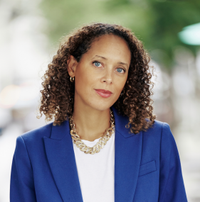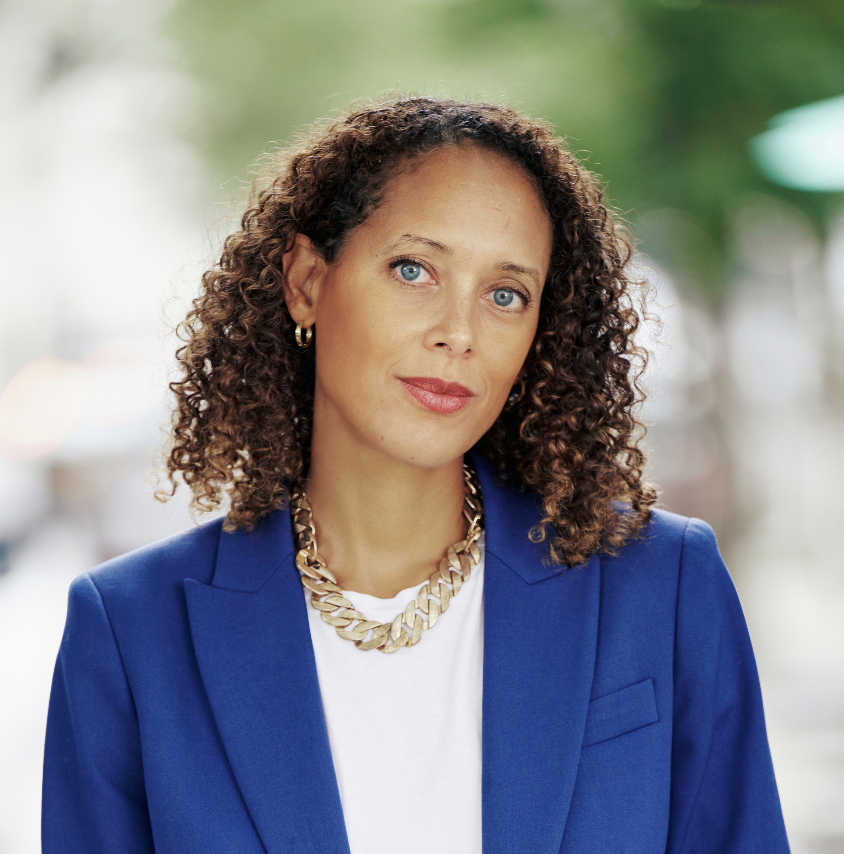June Sarpong: 'The more women are empowered, the more men are released from the self-created bondage of patriarchy'


Celebrity news, beauty, fashion advice, and fascinating features, delivered straight to your inbox!
You are now subscribed
Your newsletter sign-up was successful
June Sarpong’s name is synonymous with activism, with her iconic book The Power of Women hailed as a manifesto for modern women. Exploring gender equality and its essential role in our economic and social progress, June deep dives into sexism and how best to eradicate it.
‘Patriarchal rule means that men live in a subconscious perennial fear that one day women will rise up and make them surplus to requirements,’ June writes. ‘The reverse is true; the more women are empowered, the more men are released from the self-created bondage of patriarchy.’
Despite its original 2018 release, The Power of Women has never felt more relevant, with the pandemic exacerbating the impact of the patriarchy, disproportionately affecting women and deepening gender divides. In short, the world remains a very scary place to be a woman and June’s powerful words cut through the noise.
In the wake of the pandemic and the tragic murder of Sarah Everard, June reissued an updated version of her groundbreaking book, with new chapters on COVID-19 and safety, among others.
As the updated version of The Power of Women hits the shelves, June exclusively shared an extract from her new introduction with Marie Claire…
Extract from The Power of Women Words by June Sarpong
When the legendary fashion designer Diane von Furstenberg was eight years old, she met the mother of one of her school friends. This woman was a wife, mother and a successful businesswoman. In that moment Diane decided that this was the woman she wanted to be: ‘An independent woman, a woman who could pay for her bills, a woman who could run her own life - and I became that woman.’ As I rode with her in the elevator at the Women: Inspiration and Enterprise conference (WIE), I asked Diane for the one piece of advice that she would give any young woman starting out. She answered: ‘Clarity comes first. I’ve never met a woman who at her core isn’t strong. When we get together and bring out that side of ourselves, we really can change the world.’
Celebrity news, beauty, fashion advice, and fascinating features, delivered straight to your inbox!
The sort of effervescence that Diane von Furstenberg and others, like co-founder of Huffington Post Arianna Huffington, actress Helen Mirren, talk show host and producer Oprah Winfrey and model, actress and entrepreneur Iman, exude only comes with age, which is why I am perplexed by the way we treat women over the age of fifty in the West. As Western women age, society makes them feel more and more invisible: they disappear from television screens, magazine covers, billboards and mediums associated with allure and desirability. Surely we should revere these women, rather than cast them aside?
There is power in claiming every part of ourselves and the whole spectrum of our life’s journey. As a woman, self-acceptance will probably be the hardest thing you ever strive to attain, as with self-acceptance comes confidence. Everything in the patriarchy is designed for us to remain underconfident, softly-spoken, and unopinionated so that we never experience our full power during our lifetime.
The impact of the patriarchy has seemingly become exacerbated by the coronavirus pandemic. A survey carried out by the humanitarian agency CARE International found that women, who are generally far more likely to be employed by the service and informal sectors, have disproportionately been losing their jobs, and that they are 60 per cent more likely than men to report that this has had one of the biggest impacts on their lives. For many people who work in these sectors, unemployment benefits are not offered. In other areas where they are offered, such as the Côte D’Ivoire in West Africa, they are required to be paid to the head of the household – often a man – leaving some women without any compensation despite them often being required to buy and prepare all of the food for their family members. This, paired with a drastic increase in both domestic violence and in the amount of unpaid care work that women have been expected to carry out throughout the pandemic, has caused a global mental health crisis. In many ways, the pandemic hasn’t created these issues. It has only forced the fact that women across the world are still not being afforded the same job opportunities as men, and are still expected to take on the majority of unpaid care work, further into the spotlight.
It is vital, then, that we act on these statistics and push for change so that women’s rights do not regress in the face of this pandemic, and that instead we rise from it stronger. That is why it is now time for us to stand up and save ourselves spiritually, mentally, and physically. In so doing, I believe we can save humanity from a system that has been detrimental to everyone, including those who created it in the first place – cisgender heterosexual men.
Patriarchal rule means that men live in a subconscious perennial fear that one day women will rise up and make them surplus to requirements. The reverse is true; the more women are empowered, the more men are released from the self-created bondage of patriarchy. In doing so, men will no longer be forced to be in constant competition with one another, or to never be vulnerable, which contributes to so many mental health issues and suicides.
My encounter with Diane von Furstenberg happened in 2012 and has stayed with me ever since, forcing me to examine the woman I want to be and how I can overcome the impediments that prevent me from becoming her. The courage and confidence of women like Diane, created by her steadfast belief that everything she does is right for her, exemplifies why all women must decide who it is they want to be and then figure out how to become that.
We must encourage and empower each other’s dreams and ambitions. We must listen to each other’s fears and insecurities – but we must not allow ourselves to be paralysed by them. And we must challenge societal structures and institutions that hold female emancipation back.
I accept this is easier said than done, but for the sake of humanity we must try – the world is in crisis and needs women to help solve the serious issues such as climate change, poverty, injustice, gender discrimination, and barriers to education that threaten the very survival of our species. Despite women making up around half of the world’s population, there are so few of us working in the industries that are directly trying to tackle these problems. Just imagine what we could achieve if we had access to all that untapped brain power.
I am working on becoming the woman I want to be and still have a long way to go. Part of the reason for me writing The Power of Women is to help myself and others develop a clearer vision of who that woman is. Daily positive affirmations go a long way towards helping to challenge the kind of negative self-talk that many women are plagued with and that often hold us back. There are a number of inspirational affirmations and quotes that can be found at my brand, www.womanly.co.uk. I urge you to use these messages to help you to create a new self-image.
As women, we must all strive to ensure that, one day, we’ll look in the mirror to find the woman we want to be smiling back at us. When that moment happens, take a moment to revel in everything it took to become her.
BUY NOW: The Power of Women by June Sarpong
The Power of Women by June Sarpong is out now.

Andrea Thompson is Editor in Chief at Marie Claire UK and was named by We are the City as one of the UKs top 50 trailblazers for her work championing gender equality. She sits on the committee of the British Society of Magazine Editors where she acts as Chair.
Andrea has worked as a senior journalist for a range of publications over her 20 year career including The Sunday Times, The Guardian, The Daily Mail, Channel 4, Glamour and Grazia. At Marie Claire UK, Andrea oversees content, strategy, events and campaigns across fashion, beauty and the brand's purpose pillars. Follow her on instagram at @andreacanwrite